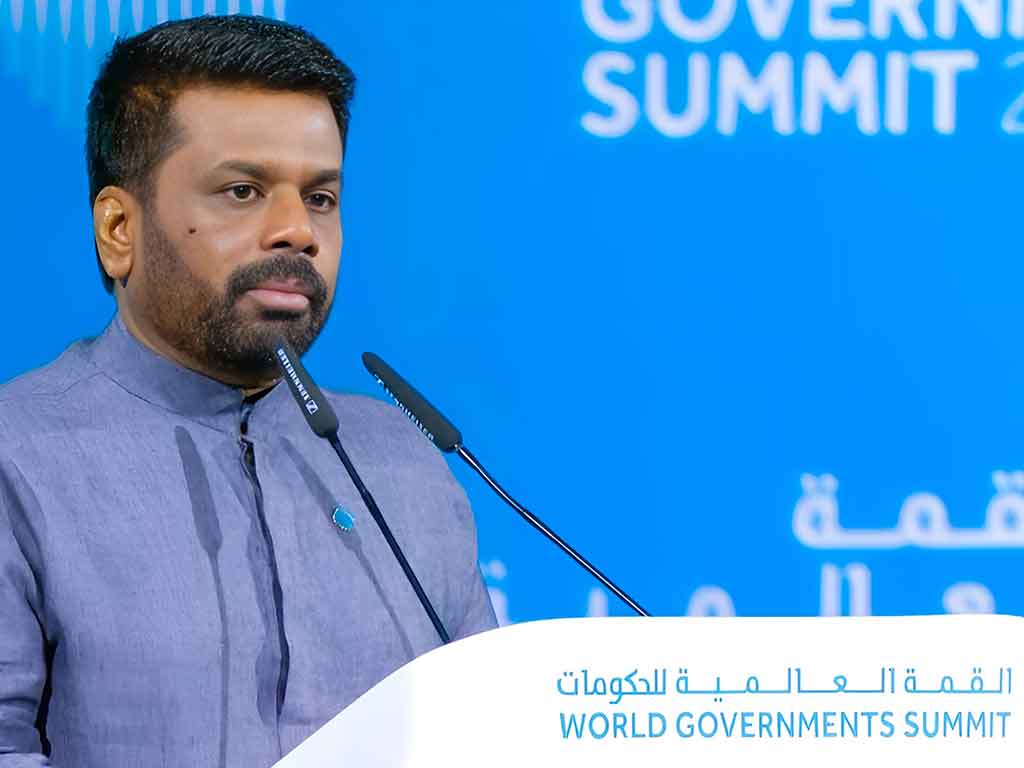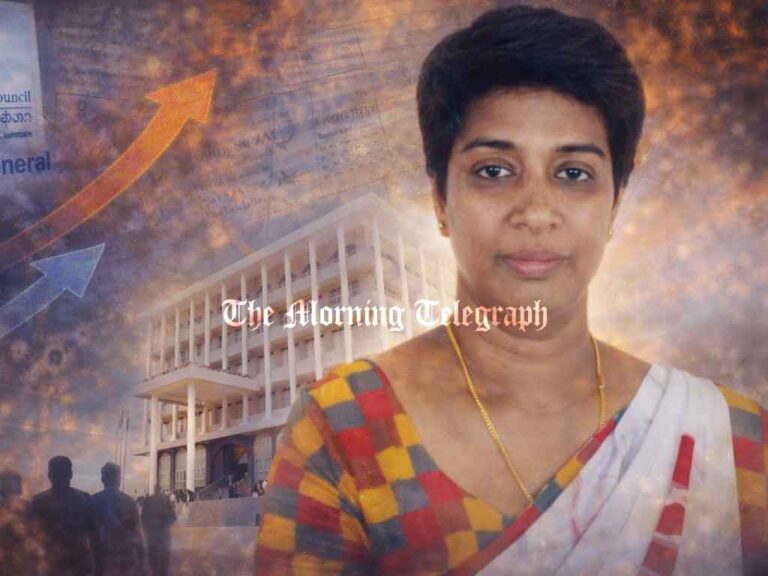
President Anura Dissanayake, who attended the 2025 World Government Summit in the United Arab Emirates, returned to the country this morning.
The Presidential Media Unit has corrected and republished two minor omissions from the President’s speech at the summit.
The phrases “Indian continent” and “speed of light years” were omitted during the President’s address, and the edited version has been widely circulated on social media since yesterday.
The full speech, as correctly compiled and published by the Presidential Media Unit, is as follows:
“Honorable Heads of State, Delegates from various organizations, Distinguished Guests, and Fellow Journalists,
It is a great pleasure for me to address this unique conference, which is being held at a critical juncture in human history and at a time when unprecedented global cooperation is urgently needed.
My country is a beautiful island with a rich history, a present that dreams of the future, and a citizenry equipped with extensive political and social knowledge. The people of my country possess a deep sense of empathy for any event that occurs anywhere in the world. They cherish tradition while also demonstrating wisdom in adapting to necessary changes.
If you search the internet on your mobile phone right now and ask, ‘Which country donates the most eyes in the world?’ you will find the country I represent, located at the bottom of the Indian subcontinent—Sri Lanka.
I am proud to address you on behalf of a nation filled with such selfless, warm-hearted citizens.
I firmly believe that this conference, which focuses on developing future strategies and plans in crucial areas affecting humanity, will contribute to the well-being of the global community.
The problems we face today—at national, regional, and global levels—are vast and complex.
Some, unaware of these challenges, continue their own selfish pursuits. However, when today’s isolated problems evolve into issues that knock on the doors of the entire world tomorrow, their isolated journey inevitably comes to an end.
Therefore, I once again emphasize the urgent need for us to come together as global citizens to address challenges that transcend borders.
There is a pressing need for collective global action and a united front to confront these challenges.
Enhancing accountability and efficiency in governance is essential for the future of the world. Individual responsibility must be channeled into a collective effort.
The demand for responsibility and accountability from state institutions and bureaucrats will have a decisive impact on the future.
Social justice and the rule of law are fundamental to building a well-structured state and a functioning world. Proper implementation of agreements and laws, systematic support for low-income and vulnerable communities, and ensuring opportunities for free media and social activists are crucial in holding officials accountable.
The emergence of digital access rights, environmental rights, and other new rights not included in the 1948 Human Rights Agenda, along with evolving political systems, calls for an updated Universal Declaration of Human Rights. I am reminded of the importance of being sensitive to these changes and intervening at this critical time.
In establishing a global community founded on sustainable values, it is vital to respect the world’s diverse cultural traditions.
Furthermore, with nearly 60 percent of the poorest nations experiencing or at high risk of a debt crisis, concerns about the future of the global economy are mounting. These nations are struggling with tightening global financial conditions, significant upcoming debt payments, and a widespread sovereign debt crisis. The transition to financial reforms that can reasonably adapt to the modern world is of utmost importance at this time.
Simultaneously, we are moving towards the dire consequences of uncontrolled industrial growth, including climate change, biodiversity loss, and severe pollution. These threats are more alarming than a giant asteroid hurtling toward Earth from light years away. Although developed nations have historically contributed to three-quarters of carbon dioxide emissions, they are far less exposed to the consequences of climate change. While the world pursues economic development, many naturally beautiful low-income countries are suffering from the waste generated by others. The pristine beaches of such nations and islands have fallen victim to environmental destruction.
If you ever visit my country, you will be amazed by the coastline that surrounds it. As a nation, we are making great efforts to protect the beauty of our shores.
The digital revolution has already transformed the way people live, work, and communicate. However, the same technologies that have the potential to improve the lives of billions are also creating unprecedented challenges for citizens and governments worldwide.
Consider a simple computer virus. Today, cyberattacks pose a greater threat than gunfire, aerial bombings, or even nuclear attacks of the past. There are international laws prohibiting the targeting of civilians in conventional warfare. Shouldn’t cyberwarfare be governed by similar laws?
Meanwhile, over the next two decades, several health challenges are expected to persist and intensify due to population growth, urbanization, and antimicrobial resistance.
As humans, we are interconnected. For more than a year, a virus forced the vast majority of humanity to wear face masks. It exerted immense pressure on everyone, from the most powerful nations to the poorest.
The year 2024 has also witnessed the rise or resurgence of several infectious diseases.
Among non-communicable diseases, cancer continues to have a devastating impact on millions of lives. Even now, countless cancer patients hover between life and death. Heart disease, ignoring national borders, has become a significant global crisis. Health experts predict that by 2030, the worldwide economic burden of mental illness could exceed $16 trillion.
Additionally, it is projected that by 2050, the climate crisis could lead to another 14.5 million deaths.
It is crucial to focus on digital health, emerging medical technologies, environmental health and sustainability, and financial support for economically vulnerable nations to strengthen global healthcare systems.
Honorable guests,
You may be representing the Middle East. You may be representing Africa, Asia, Europe, or the West. But the challenges we all face—and the universal call for love and unity that resonates within us—urge us to come together and build a better world.
As Martin Luther King Jr. once said, “We must learn to live together as brothers.”
We have given the people of our country a vision—to unite in creating a “beautiful life and a prosperous nation.” Historically, they have embraced this goal.
At this historic summit, I make this appeal to you: Let us come together to create a beautiful life and a better world.
Thank you very much to everyone.”
Presidential Media Division




